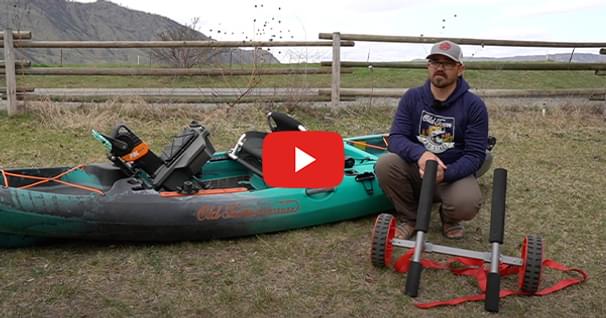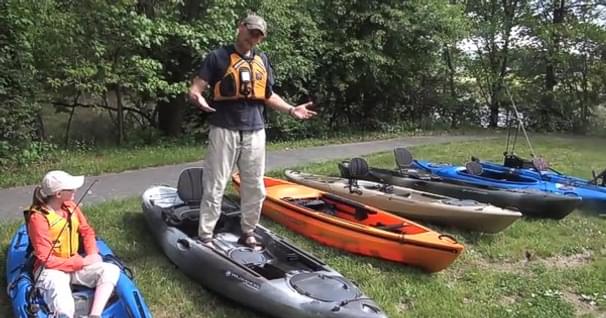Starting Your Paddling Library
I remember buying my first sea kayaking manual after meeting its author, John Dowd, at an early kayak symposium in Anacortes, WA, back in the mid-eighties. Since then I’ve added scores of sea kayaking and canoeing books to my collection.
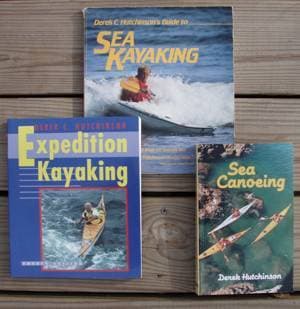
For those of you who are thinking of building a paddling library, may I suggest the follow, albeit incomplete and biased, bibliography of what I consider to be the essential and in some cases, pre-eminent paddling books for any kayaker or canoer’s library:
Sea Canoeing/Derek Hutchinson – first published in 1976, this book defined sea kayaking then and represents the foundation for information on modern kayaking techniques and gear. You may certainly recognize some of the illustrations – they pop up, literally pen stroke for pen stroke in most books written on the subject some thirty years after its publication. This is the first of several editions and many more titles including several runs of Expedition Kayaking by the grand master himself.
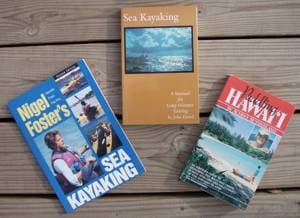
Sea Kayaking – A Manual for Long-Distance Touring/John Dowd – Paddling thousands of miles in his double Klepper, John Dowd became, by default, one of the early leaders in recreational kayaking in America. His modestly epic voyages showed the rest of us that this was more than a weekend float across a pond. Sea kayaking was still a Pacific NW/east coast/UK sport when John’s book came out. It showed us how to roll, how to read the tides – all the things Derek’s book did – and reinforced the importance of that knowledge as “must know” basics for this upcoming sport. John’s Sea Kayaker magazine remains one of his many legacies to those who are sea kayakers.
Paddling Hawaii/Audrey Sutherland- I remember first learning about Audrey because she was the woman who explored the Napali Coast of Kauai by swimming it! That’ right, she didn’t even use her famous inflatable kayak for some of her earlier adventures. She had paddled over 4,000 miles (including the Inside Passage of Alaska) long before most of us had ever heard of “sea kayaking”. Her first book, “Paddling My Own Canoe” should actually top this list as one of those classic books from 1980’s that help define the sport.
Nigel Foster’s Sea Kayaking/Nigel Foster – Those Brits were serious kayakers way back when. Nigel, “one of the most charismatic and talented kayaking instructors in the world” as his book jacket rightly proclaims, brought step-by-step instruction to new heights and showed us exactly how to execute those maneuvers with those long, narrow crafts. His epic sea voyages and continuing presence at symposia where he shares his love for the sport through instruction and design (like fellow Brit Derek Hutchinson), makes his book an obvious addition to the list of masters.
There are so many more sea kayaking books on the market today. Literally scores of them tell us what it’s like to paddle along certain coastlines while others repeat basic information in an updated fashion. There are also those books that showed us the associated skills and disciplines we should learn if we wanted to be well-rounded sea-faring paddlers. Here are three of many, many more books worth having that represent that genre:
- Fundamentals of Kayak Navigation/David Burch – About the same time Dowd was telling us how much fun it can be to paddle in tropical waters, David Burch was telling us all about lat/long, tide tables and crossing currents. This was serious stuff that most of us had to learn – from scratch – from David’s classic book. Others have come along with fine instruction as well (Lee Moyer, for one) but this belongs alongside the other classics.
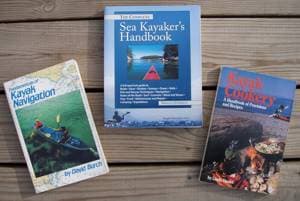
- Kayak Cookery-A Handbook of Provisions and Recipes/Linda Daniel – What? It’s not just writing about feathered paddles and high braces? Linda’s book showed us that we could have our cake and eat it, too –with wonderfully quick and tasty recipes. It showed the rest of the world that these big, roomy boats allowed practitioners to enjoy some mighty fine gourmet meals as part of the kayaking experience. Our knowledge base (in 1988) was already expanding in order to keep up with the growing interest in the sport.
- The Complete Sea Kayaker’s Handbook/Shelly Johnson – While this title sounds like so many more that started to flood the bookshelves, Shelly’s approach was straightforward, friendly, knowledgeable and loaded with so much information. This was like reading a journal meticulously crafted from every word of wisdom uttered at a sea kayak symposium. Great photos, logical sequences of information and wonderfully expressed. Clearly the enthusiasm we all see in Shelly personally, we see amply reflected in this book. One of many, but clearly at the top of the shelf.
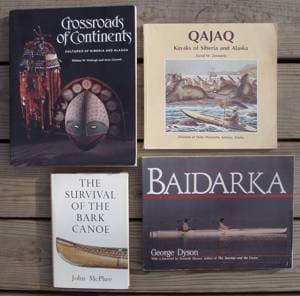
The historical perspective of sea kayaking and canoeing is very well represented in various tomes – some scholarly, some a campfire narrative. It’s always fascinating to learn about the kayakers from ancient times, who built boats very much similar in design to those built hundreds of years later.
- Qajaq-Kayaks of Siberia and Alaska/David W. Zimmerly – Zimmerly’s name is synonymous with the history of kayaks. So much of Zimmerly’s knowledge came from studying authentic museum kayaks and tools right near their original building sites. He literally measured boats on his hands and knees and then reproduced those findings in this wonderful book. So new was some of his research that he had go back and start over. His drawings and notes outline the progress of kayak building across the Pacific Ocean to Alaska.
- Crossroads of Continents – Cultures of Siberia and Alaska/William W. Fitzhugh and Aron Crowell – This is Smithsonian-quality publishing featuring the cultures of the Pacific Rim covering thousands of years of development. It contains some of the most fascinating information on native kayaks you’ll find anywhere. If you ever wanted to learn anything about the lifestyle of those who lived along the Arctic and sub-Arctic Pacific Rim, this is the book for you!
- Baidarka/George Dyson - an interesting juxtaposition of native history, Russian “influence” and modern technology all fused together in a classic in its own style. It features some great photos and illustrations of early native kayakers as well as a photo journal of a kayak builder who lived in a tree house and designed native boats out of aircraft material. I can say no more.
- Survival of the Bark Canoe/John McPhee – One of the few of so many great books focusing on the canoe. This is a classic, somewhat romantic narrative of the building of a birch bark canoe. McPhee is a well-know author (Coming Into the Country) who blends history with handicraft. It’s an easy read that should belong in every canoer’s library!
Slipping back to the kayaking side of the bookshelf once again, I have to add Sea Kayaker – Deep Trouble/Stories from Sea Kayaker magazine; Matt Broze and George Gronseth; Edited by Chris Cunningham – OK, I am partial to this one because I have a little sidebar article published in it as well. The book talks about the things that can go wrong while sea kayaking – failed surf landings, inexperience and just plain stupidity. It’s an instruction book that hopefully enables you to learn from other’s mistakes and misfortune. Broze and Gronseth are themselves founding members of the sea kayaking interest that began blooming in the US in the mid eighties. Their expertise enables them to comment with authoritative hindsight into accidents first reported in the pages of Sea Kayaker magazine over the years.
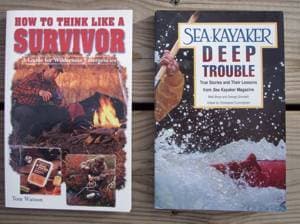
How To Think Like a Survivor/Tom Watson – Personal vanity aside, and the fact my publisher would disown me if I didn’t mention it – I spent several years doing survival sense presentations at kayak symposia on both coasts and throughout the Midwest. Those presentations, usually entitled Seven Step to Survival for Sea Kayakers, provided me will a lot of good, common sense tips for dealing with being stranded or lost in remote areas – places kayakers like to visit. This is not a paddling only book, but any serious, remote shoreline paddler may want to know many of the skills reviewed in this book.
There are so many more good books and authors out there: The Hidden Coastline by Joel Rodgers, Seekers of the Horizon by Will Nordby, books on technique by many good authors and paddlers. All make for great off-season reading or for refreshing those brain cells.
Tom Watson, an avid sea kayaker and freelance writer is also the author of "How to Think Like A Survivor" available on Amazon.com and most major bookstores.
Related Articles
Tyler Hicks, brand ambassador for Old Town Canoe and Kayaks, shares some tips on how to choose a kayak…
This question is from imsealin – they asked how long should a kayak be for sea kayaking, and can it be…
By Claudia Kerckhoff Van WijkDirector, Madawaska Kanu Centre The "Canadian" on this page is not…
Hi, Jeff Little here. I'm the regional Pro Staff director for the Wilderness Systems Fishing Team. I'm…
